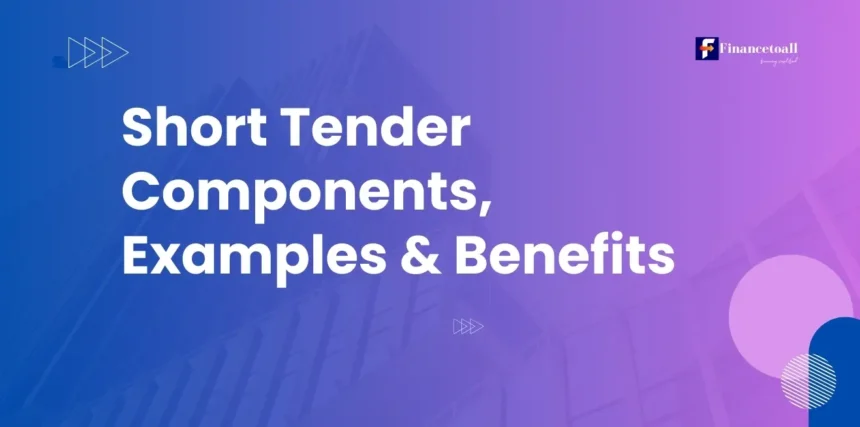The Ultimate Guide to Short Tender Everything You Need to Know
A short tender happens when an investor offers to sell more shares in a tender offer than they own, planning to buy the extra shares later to fulfil the commitment. While this might seem like a way to profit from market fluctuations, it carries significant risks and is often prohibited by financial regulations.
In this article, we will cover Key Takeaways about short tender, its risks, rules, and real-world applications. By the end, you’ll have a solid understanding of how it works and why it matters.
Key Takeaways About Short Tender
- Short tender is when investors offer more shares in a tender than they own, intending to buy them later. This can lead to significant losses if stock prices rise unexpectedly.
- Rules like the SEC’s Rule 14e-4 prohibit tendering shares you don’t own to ensure market fairness, with violations leading to penalties.
- Companies use tender offers to repurchase shares or during mergers, often offering premium prices that attract speculative practices.
- Investors should only tender shares they own and consider safer alternatives like arbitrage or holding for long-term gains.
- Understanding rules, tracking market trends, and seeking expert advice are key to minimizing risks and maximizing gains in tender offers.
What Is a Short Tender?
A short tender happens when someone offers to sell more shares in a tender offer than they actually own. Why would anyone do that? The idea is that they’ll buy the shares later to “cover” the gap, usually at a lower price, hoping to make a profit.
What’s a Tender Offer?
A tender offer is when a company or investor offers to buy shares from existing shareholders at a set price, usually higher than the current market price. It’s common during mergers, acquisitions, or share buybacks. For example:
- Imagine Company A announces a tender offer to buy back shares at $50 each. The stock is currently trading at $45.
- Investors may rush to sell their shares at the higher price.
How Does Short Tender Work?
Here’s how it plays out:
- A tender offer is announced.
- Some investors tender (offer to sell) more shares than they actually own.
- They plan to buy the shares later hopefully at a lower price to deliver them as promised.
Let’s take a simple example to understand this concept:
- You own 100 shares of a company, but you tender 150 shares in a buyback offer.
- To fulfill the extra 50 shares, you plan to buy them on the open market before the settlement deadline.
- If the stock price drops to $40 after you tender, you can buy those 50 shares for $40 each, sell them to the company for $50, and pocket the difference.
Why Is Short Tender Risky?
Short tendering might seem like a clever way to make quick money, but it’s full of risks.
1. Stock Price Could Rise
If the stock price goes up instead of down, your plan backfires. For example:
- The tender price is $50, and you tender 150 shares.
- Instead of dropping, the stock price shoots up to $55.
- Now, you’ll lose money buying those 50 shares at $55 to sell them for $50.
2. Regulatory Penalties
In many places, including the U.S., tendering shares you don’t own is illegal unless you have a legitimate plan to acquire them. The Securities and Exchange Commission (SEC) enforces strict rules to prevent manipulation.
3. Settlement Risks
The timeline for tender offers is tight. If you fail to acquire the shares in time, you may face penalties, legal action, or financial losses.
What Does the Law Say About Short Tender?
Short tendering is heavily regulated. In the U.S., SEC Rule 14e-4 makes it illegal to tender more shares than you own unless you meet specific conditions. Here’s what the rule ensures:
- Transparency: Investors must disclose their actual ownership.
- Fairness: Prevents manipulation that could harm other shareholders.
- Accountability: Investors must be able to deliver the shares they tender.
Violating these rules can lead to fines, lawsuits, or even bans from trading.
Real-World Example of Short Tender
Let’s look at a hypothetical example:
- Company XYZ announces a tender offer at $60 per share.
- You own 200 shares but tender 300 shares, planning to buy the extra 100 later.
- Unfortunately, the stock price rises to $65 during the tender process.
- To fulfill your commitment, you must buy 100 shares at $65, meaning you lose $5 per share ($500 total).
This shows why short tendering is more of a gamble than a strategy.
Benefits of Tender Offers (Without Short Tendering)
Tender offers themselves can be a good opportunity for shareholders. Here’s why:
- Premium Price: Companies often offer to buy shares at a higher price than the current market value.
- Liquidity: Shareholders can sell their shares quickly and easily.
- Simplified Process: Tender offers often involve fewer fees compared to selling shares on the open market.
But engaging in short tendering introduces unnecessary risks.
How to Avoid Short Tender Risks
If you’re considering participating in a tender offer, here are some tips:
- Know the Rules: Understand the SEC regulations or local laws governing tender offers.
- Check Your Holdings: Only tender the shares you actually own.
- Monitor Market Trends: Keep an eye on the stock price during the tender period.
- Consult an Expert: Talk to a financial advisor if you’re unsure.
Alternatives to Short Tender
There are safer and smarter ways to profit during tender offers:
- Arbitrage Strategies: Look for pricing gaps between the tender offer price and the market price.
- Buy and Hold: If the company’s offer signals growth potential, holding your shares might be a better choice.
- Sell on the Open Market: Sometimes, selling your shares in the market can be more profitable.
Key Differences Between Tender Offers and Short Tender
Tender Offer vs. Short Tender: A tender offer is a formal process where shareholders sell their shares at a set price, while a short tender involves tendering more shares than owned, often leading to regulatory and financial risks.
Here is a table comparing Tender Offers and Short Tender:
| Aspect | Tender Offers | Short Tender |
|---|---|---|
| Definition | A company’s offer to buy back its shares or acquire another company’s shares at a specified price. | Investors offering to sell more shares in a tender than they currently own. |
| Purpose | Typically used for share buybacks or mergers and acquisitions. | A speculative strategy aimed at profiting from the tender process. |
| Ownership Requirement | Requires shareholders to own the shares they are tendering. | Involves tendering shares that the investor does not currently own. |
| Regulation | Governed by rules ensuring transparency and fairness in corporate actions. | Prohibited by regulations like the SEC’s Rule 14e-4 to prevent manipulation and unfair practices. |
| Risk | Limited risk for shareholders who tender owned shares. | High risk due to potential stock price increases and regulatory violations. |
| Outcome for Investors | Investors may benefit from premium prices offered by the company. | Risk of losses if unable to acquire shares at favorable prices before settlement. |
| Legality | Fully legal and regulated process for share transactions. | Illegal in many jurisdictions when shares tendered are not owned, with penalties for violations. |
| Speculative Nature | Typically a straightforward corporate action with defined terms. | A speculative practice that relies on timing and market movement. |
How Companies Handle Tender Offers
Companies also have responsibilities during tender offers. They must:
- Disclose Details: Clearly communicate the offer price, deadline, and conditions.
- Follow Regulations: Ensure compliance with rules to protect shareholders.
- Manage Fair Distribution: Handle tendered shares transparently to avoid favoritism or fraud.
Short Tender in Mergers and Acquisitions
Short tendering sometimes becomes a hot topic during mergers and acquisitions (M&A). For example:
- A company might make a tender offer to buy shares as part of an acquisition deal.
- Investors might speculate on short-term price movements, leading to short tendering.
While M&A deals often attract attention, short tendering is not the best way to capitalize on them.
Conclusion
Short tendering might sound like a clever trick, but it’s often a risky gamble. Understanding the rules and risks is essential to avoid costly mistakes. Instead of chasing quick profits, focus on smart, strategic investing.
Frequently Asked Questions About Short Tender
1. What is a short tender in finance?
A short tender occurs when an investor offers to sell more shares in a tender offer than they actually own. They plan to buy the additional shares later to fulfill the commitment. This practice is risky and often restricted by regulations.
2. Are short tenders illegal?
In many jurisdictions, including the U.S., short tendering is illegal unless specific conditions are met. The SEC’s Rule 14e-4 requires investors to own or have a plan to acquire the shares they tender. Violating this rule can lead to fines or other penalties.
3. Why would someone engage in a short tender?
Investors might try short tendering to profit from a difference between the tender offer price and the stock’s market price. For example, if they believe the stock price will drop after the tender offer, they might tender more shares than they own, expecting to buy the extra shares at a lower price later.
4. What are the risks of short tendering?
1. The stock price could rise instead of fall, leading to financial losses.
2. Investors might fail to acquire the shares in time, resulting in penalties or legal action.
3. Regulatory violations can lead to fines or bans from trading.
5. How does the SEC regulate tender offers?
The SEC enforces Rule 14e-4, which prohibits investors from tendering more shares than they own unless they have a specific plan to acquire the shares. This rule ensures transparency, fairness, and accountability in the financial markets.
6. What is the difference between a tender offer and short tendering?
A tender offer is when a company offers to buy back shares at a fixed price, often higher than the market price. Short tendering, on the other hand, involves an investor offering to sell more shares than they own, which introduces additional risks and regulatory concerns.
7. Can short tendering be profitable?
While short tendering might seem profitable in theory, the risks often outweigh the potential gains. A rising stock price, regulatory penalties, or settlement failures can turn a speculative move into a costly mistake.
8. What are safer alternatives to short tendering?
Instead of short tendering, investors can:
Participate in the tender offer with the shares they own.
Explore arbitrage opportunities if there’s a price gap between the tender offer and market prices.
Sell shares on the open market if the price is favorable.
Hold shares for potential long-term gains.
9. How can investors avoid short tender risks?
To avoid risks, investors should:
Only tender shares they own.
Familiarize themselves with SEC regulations or local laws.
Monitor stock price trends during the tender offer.
Consult financial advisors for guidance.
10. How do tender offers affect stock prices?
Tender offers often cause stock prices to rise temporarily, especially if the offer is at a premium to the current market price. However, prices can fluctuate based on investor sentiment and market conditions.
11. What role do tender offers play in mergers and acquisitions?
Tender offers are a common tool in mergers and acquisitions. A company might use a tender offer to acquire shares from existing shareholders as part of its strategy to take over or merge with another company.
12. Can individual investors participate in tender offers?
Yes, individual investors can participate in tender offers by tendering the shares they own. However, they must follow the rules and understand the offer’s terms to avoid risks.
13. What should companies do to prevent short tendering?
Companies can:
Clearly outline tender offer rules and conditions.
Ensure compliance with regulations to prevent manipulation.
Monitor shareholder activity to detect potential short tendering practices.
14. Is short tendering common in financial markets?
Short tendering is not widespread due to its risks and legal implications. However, it might occur in speculative markets where investors try to capitalize on price gaps.













